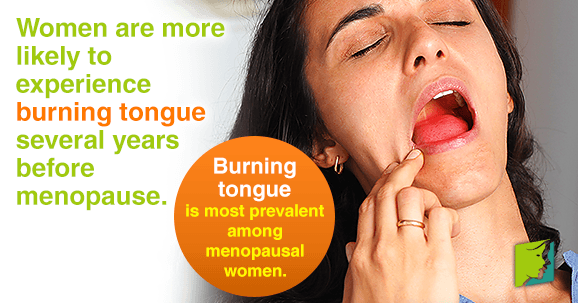Also known as burning mouth syndrome, this peculiar condition disproportionately affects women more than men. Burning tongue is characterized by a dry or burning sensation in the mouth, especially on the tip or the back of the tongue. This sensation can also be felt in other areas of the mouth, such as the bottom lip and gums. Burning tongue is sensory-based, so it does not manifest itself in visible signs on the tongue. Women are most likely to begin noticing signs of burning tongue several years before menopause or for up to 12 years after menopause. This condition may last for several years before subsiding.
Most women report no symptoms after waking up in the morning but that they appear and increase in severity as the day progresses.
Other signs of burning tongue include itchiness inside the mouth, a metallic taste, a tingling sensation on the tongue and altered tastes of foods.
Medical Prognosis
Medically, this symptom is known as stomatodynia or stomatopyrosis. The causes of burning tongue have eluded physicians, thus the diagnosis of the condition is usually made after eliminating other possible causes for the sensation.
Possible Causes
According to the American Academy of Family Physicians, the onset of burning tongue can be precipitated by instances such as a visit to the dentist or the start of a new medication regimen. However, in about 50 percent of cases, the symptom presented itself spontaneously.
Though the medical community has not agreed on a specific cause for burning tongue, there are some factors to consider.
Taking into account that burning tongue is most prevalent among menopausal women, medical professionals have examined the potential role that estrogen plays in the onset of this ailment. This hormone is involved in the production of saliva, which implicates estrogen in potential causes of burning tongue.
In addition, estrogen is associated with the bitter taste buds in the back of the tongue. When estrogen is extremely low or absent, the pain nerve cells located near these taste buds are activated.
Treatments
Although there is no definitive cure for burning tongue, there are several ways to cope with the pain. The simplest methods would be to drink more water to encourage the secretion of saliva and to avoid spicy foods. In addition, there are several medical and alternative remedies aimed at balancing hormones during menopause that may have favorable effects on burning tongue.
More Information about Burning Tongue
Some people describe burning tongue as a prolonged sensation similar to eating extremely spicy food. Click the following link to find out more about how to deal with burning tongue.
Sources
- Associated Content.(n.d)."Burning Mouth Syndrome". Retrieved from Associated Content. www.associatedcontent.com.
- Atlantic Dental Group PC.(n.d)."Burning Tongue". Retrieved from www.atlantadentist.com.
- Epstein, Joel B.; Gorsky, Meir; Grushkamier, Miriam. (n.d)."Burning Mouth Syndrome". Retrieved from nwww.aafp.org.



